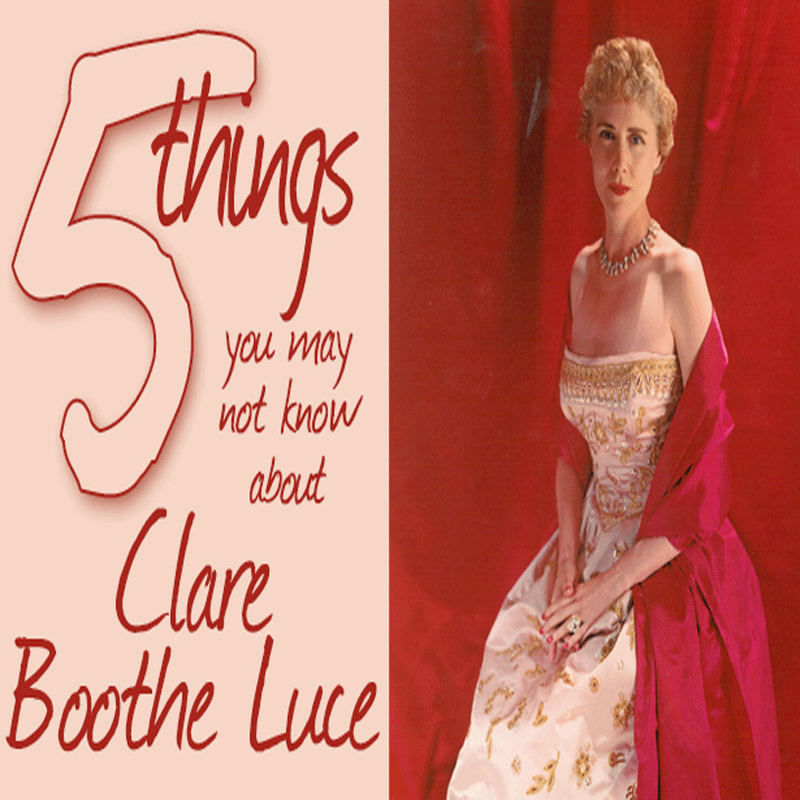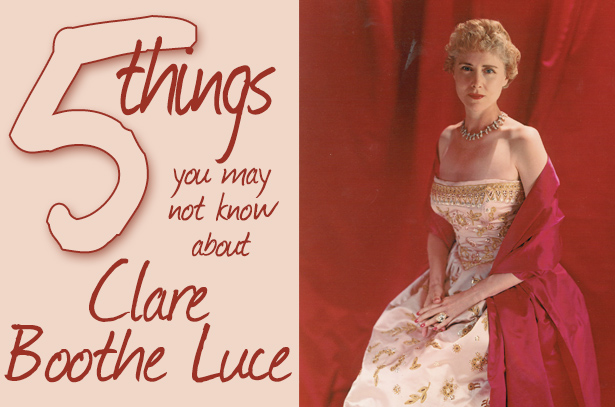
by Lil Tuttle
Clare Boothe Luce (1903-1987), our organization's namesake, was an extraordinary woman who modeled a timeless standard of leadership. You may have heard of some of her major accomplishments. She was a wife, a mother, a successful Vanity Fair magazine editor, a WWII journalist, a playwright whose best known work is still produced on stages today, an author whose books and writing helped shape American public opinion, a two-term Congresswoman, and the first woman to serve as a U.S. Ambassador to a major nation.
Here are 5 things you may not know about the woman behind those successes.
1 – She was a ‘frequent flier’ before frequent fliers had the name
As a journalist in the World War II era, Clare reported on the unfolding world crisis on two continents to Americans trying to make sense of it all.
In 1942 alone, Clare flew 75,000 miles in her quest to cover the various war fronts – an unimaginable mileage to people of that era. Much of it was aboard commercial aircraft, although she occasionally had the unique opportunity of flying on military aircraft.
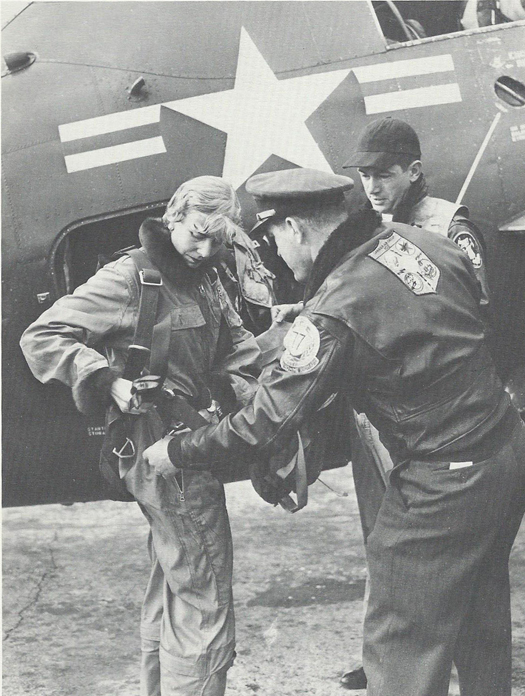
Clare prepares for flight on Navy torpedo bomber, Burma, 1942
2 – She was compassionate
During a Congressional delegation's visit to an orphanage in Rome in 1944, Clare met a red-headed 8-year-old boy named Augusto eating a breakfast of water and bread. Exposure to the cold had left his fingers and toes swollen and purple.
With permission, she took the child to her hotel, saw that he was bathed and fed, and purchased for him wool clothing, socks and shoes. She also found a church school to care for and teach him. Over the next ten years she paid for his keep and tuition, according to a biographer.
In 1949, she visited Augusto Marchesi again and, learning he had an aptitude for machine work, arranged for his training as a mechanic.
3 – She got her message across in unique ways
While serving as a Congresswoman from Connecticut, the "Wayward Wives" bill was introduced. It was designed to cut off spouse allotments to wives who were unfaithful to their soldier-husbands fighting overseas.
Recognizing myriad problems with the legislation, Clare proposed an amendment be added to the bill to double the allotments to wives whose soldier-husbands were unfaithful while fighting overseas.
The "Wayward Wives" legislation was never recommended for passage.
4 – She had a quick wit and a delightful sense of humor
During her second Congressional tour of battlefronts in Europe, the delegation visited an encampment in Italy where they talked with American soldiers. The beautiful Congresswoman was soon surrounded by young, female-deprived soldiers.
When someone asked what the Asian-looking medal pinned to her lapel was, she replied with a smile, "Order of Chastity Second Class." The men burst into laughter.
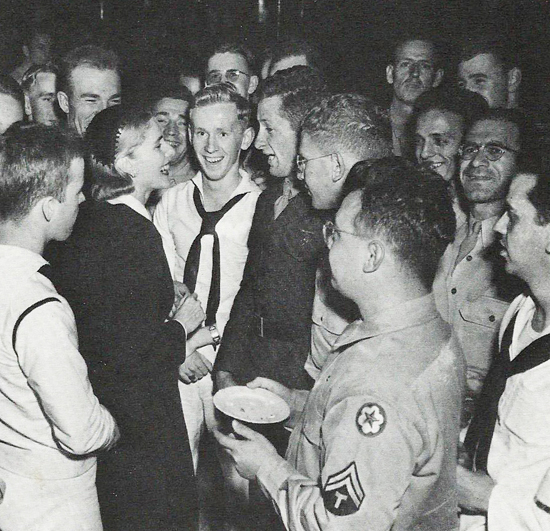
Congresswoman Luce with American soldiers, Europe, 1944
5 – She was a tireless defender of freedom and capitalism
Clare was an outspoken critic of the totalitarian ideologies terrorizing the world in her day, Nazism and Communism, and a tireless defender of democracy and capitalism. As a result, biographers' record, she alienated liberals and leftists on both sides of the Atlantic.
In a 1946 national radio broadcast debating the topic, Are Communism and Democracy Mutually Antagonistic?, Clare argued:
…our capitalist economy has many faults … I am the first to acknowledge them, and the first to say that we must improve them.
But the fact that capitalism has faults does not prove that Communism is virtuous; nor does it prove that Communism is a cure, except as a guillotine might be called a cure for a case of dandruff.
Italy was a nation teetering on the brink between Communism and democracy when Clare arrived as U.S. Ambassador with a State Department mandate to promote democracy and push back on Communist thought in the cultural, economic and political life of that nation.
The hostility that greeted her arrival slowly changed to respect as she learned the language, met the people, and spoke persuasively to various business and community gatherings. Her Italian admirers, and she accrued millions during her tenure, began referring to her fondly as la Signora – The Lady.
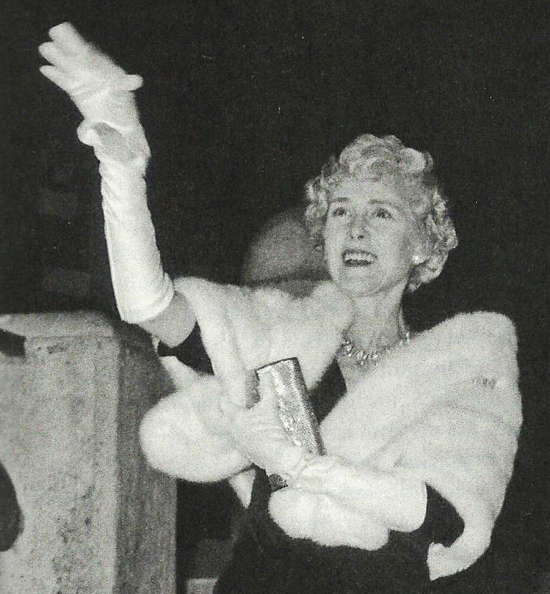
Ambassador Luce waving at Trevi Fountain, 1956
At the end of her tenure as ambassador, Clare left an Italy firmly set on the road to democracy. Milan's major daily newspaper, Corriere della Sera, editorialized, "No one will ever know how much Italy owes to this fragile blonde."
One of Clare Boothe Luce's most remembered quotes is this:
Because I am a woman, I must make unusual efforts to succeed. If I fail, no one will say, "She doesn't have what it takes." They will say, "Women don't have what it takes."
She gave "unusual efforts" to all the challenges presented to her throughout her life. Her accolades and accomplishments weren't obtained by chance. She earned them through logical reasoning, hard work and perseverance. In so doing, she gave future generations of women a timeless model of leadership.
Upon her death in 1987, Time magazine eulogized Clare Boothe Luce as "the preeminent Renaissance woman of the century." We agree and think it is particularly appropriate to remember Clare Boothe Luce today, on the anniversary of her birth, during Women's History Month.

